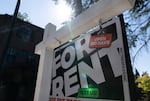
A sign reading "For Rent" is displayed on Aug. 26, 2024, in Lake Oswego, Ore. On Wednesday, Portland city councilors considered a policy prohibiting landlords from using algorithmic software to send rental rates.
Jenny Kane / AP
The first major policy change under consideration by Portland’s new City Council attempts to address one of the city’s top issues: Housing costs.
On Wednesday, councilors considered a policy prohibiting landlords from using algorithmic software to set rental rates.
This kind of software scans regional rent prices and vacancy data submitted by landlords and recommends monthly rental rates. Supporters say this “algorithmic pricing” tool helps property managers set profitable rates in a crowded market, while opponents consider it an illegal form of price fixing that stifles competition and leads to skyrocketing rental rates.
“This could be our one and only chance to protect Portlanders against corporate landlords who are price-fixing,” said Councilor Angelita Morillo, who introduced the ban.
The policy would ban landlords from using this software. Those who violate the ban could face up to $1,000 in city fines. The policy also allows renters to sue landlords who break the rules – and potentially receive more than $10,000 in damages.
Supporters of the policy say the ban will help address the city’s affordable housing crisis.
“Price-fixing products like the ones that this ordinance seeks to prohibit undermine our collective goals of housing stability and homelessness prevention,” said Becky Straus, an attorney with the Oregon Law Center who submitted testimony in support.
Brian Callaci, an economist with the Open Markets Institute, told the council that his organization has researched the impact of these tools on rents in other markets.
“The empirical evidence strongly suggests that the algorithms currently in use in housing markets do in fact drive rents higher and not lower,” he said.
Local property manager interest groups and landlords argue that using algorithms to compare rents isn’t the same as price fixing. Several landlords opposing the ban said the policy language was too vague, which could further hurt the rental market.
“This ordinance does not solve our housing crisis, it compounds it,” said Javier Alomia, a Portland-area real estate broker. “It creates confusion, drives away investment and distracts from the real solution. We need policies that support housing production, not ones that punish the people trying to provide it.”
Portland isn’t the first city to suggest ditching algorithmic rent pricing software. Four other cities have passed policies to ban this technology, and the Oregon Legislature is considering a bill that would prohibit its use statewide. Last year, Oregon joined seven states in filing a federal antitrust lawsuit against leading algorithmic software company RealPage and seven landlords, accusing them of scheming to decrease competition. Five of the landlords named in that lawsuit own or manage properties in Portland.
According to the lawsuit, at least 54,000 rental units in the Portland-Vancouver metropolitan region are managed by landlords who use RealPage.
RealPage has begun fighting back. RealPage filed a lawsuit Wednesday against Berkeley, California, for its ban on algorithmic software, accusing the policy of violating free speech
Joe Gardner, a lobbyist representing RealPage, told Portland city councilors Wednesday that the proposed policy could result in “lengthy and expensive court cases for the city.”
Gardner said that RealPage never forces landlords to raise prices and that, in most cases, RealPage users don’t choose to follow the company’s recommendations. Instead, they just use RealPage’s data to inform their decisions.
The discussion comes during a development lull in the city, where Gov. Tina Kotek and Mayor Keith Wilson have convened a task force to figure out how to more swiftly spur rental construction.
Several councilors echoed public critiques of the policy, noting that the strict penalties may deter development when the city has been struggling to meet its goal of building 6,000 new units annually. Others have signaled their support.
Due to time constraints, not all people who signed up to testify were able to speak Wednesday. Council President Elana Pirtle-Guiney said those people will be able to speak at an additional hearing Thursday afternoon.
Councilors are scheduled to discuss the policy again on April 16.
Correction: The story has been updated to say councilors are set to discuss on April 16 the policy that prohibits landlords from using algorithmic software to set rental rates. In fact, they haven’t scheduled a second vote on the policy as the previous version of the story stated.
